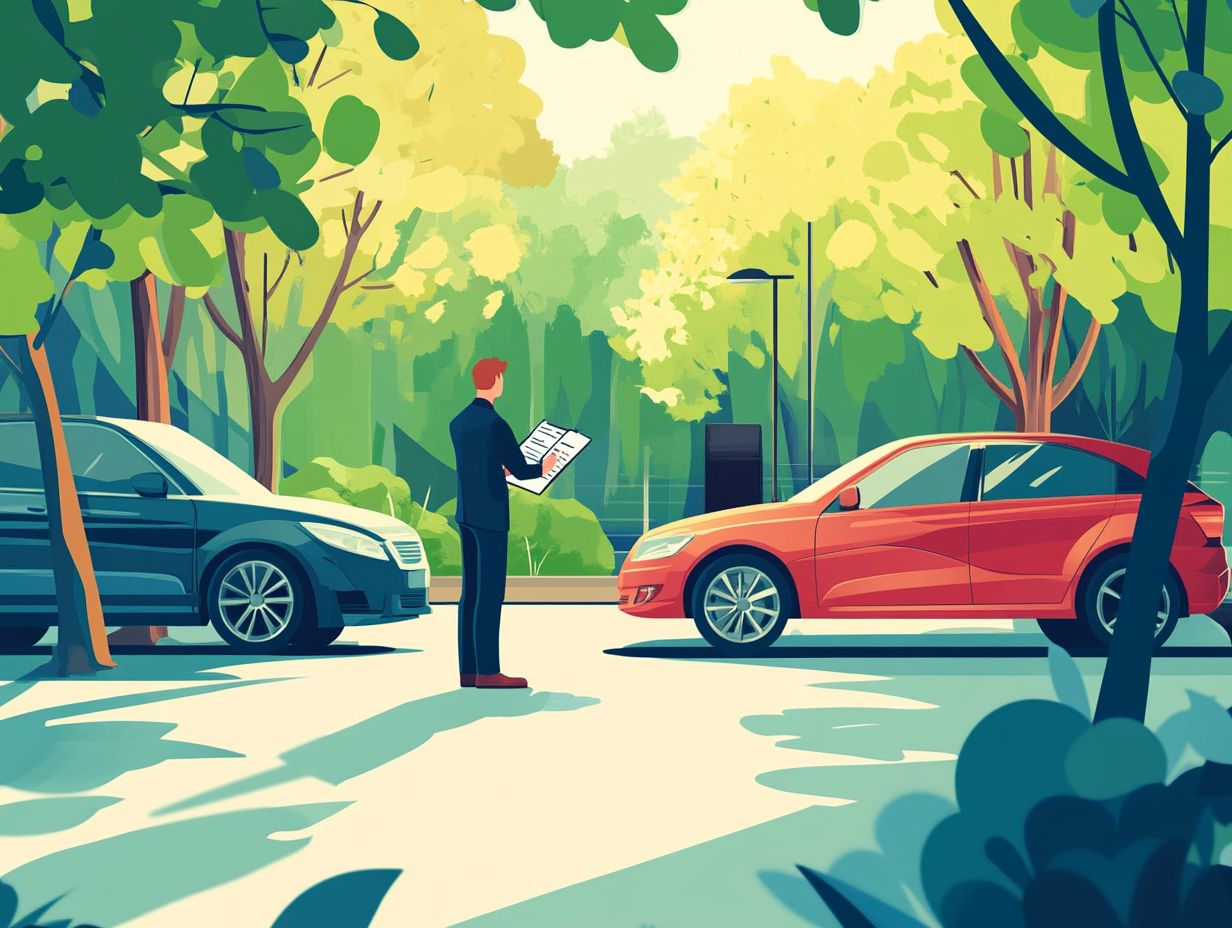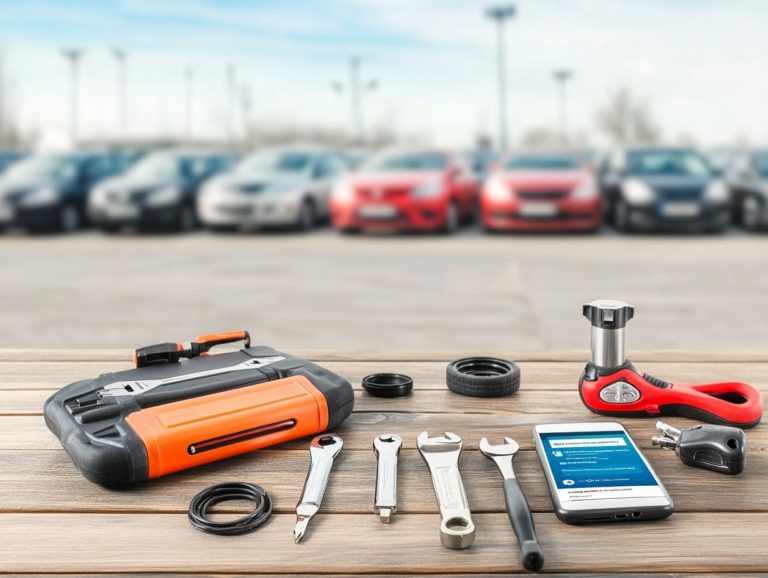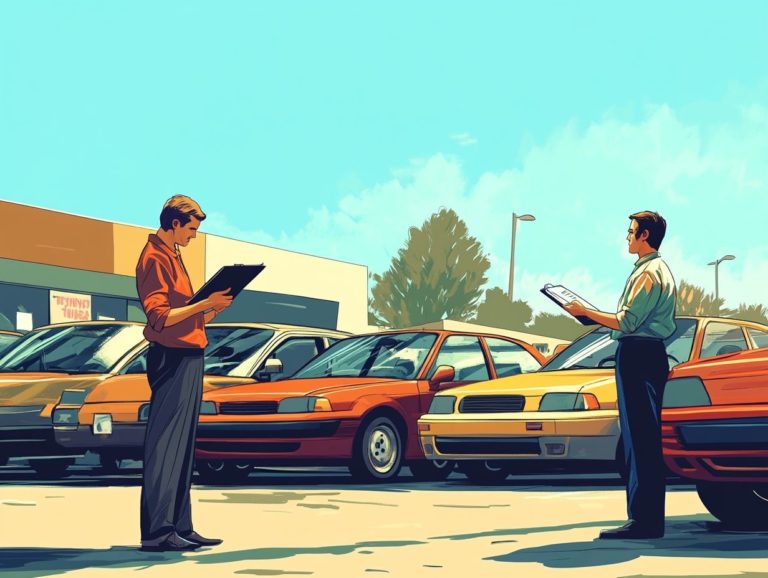The Do’s and Don’ts of Used Car Buying
Buying a used car can be both exhilarating and overwhelming. With a myriad of choices and factors to contemplate, it s vital for you to approach the process with discernment.
This guide outlines the essential do’s and don’ts of purchasing a used car, including the importance of doing thorough research, making a budget you can stick to, negotiating effectively, and steering clear of potential pitfalls.
Whether you re a first-time buyer or someone with experience under your belt, these tips will help you confidently find your perfect car!
Contents
- Key Takeaways:
- 1. Do Your Research
- 2. Set a Budget and Stick to It
- 3. Get a Vehicle History Report
- 4. Test Drive the Car
- 5. Have the Car Inspected by a Mechanic
- 6. Negotiate the Price
- 7. Consider Financing Options
- 8. Check for Hidden Fees
- 9. Be Wary of High Mileage Cars
- 10. Avoid Buying a Car As-Is
- 11. Don’t Rush Into a Purchase
- 12. Don’t Be Afraid to Walk Away
- 13. Don’t Overlook Maintenance Costs
- 14. Don’t Forget to Transfer Ownership
- 15. Don’t Forget to Get Insurance
- What Are the Advantages of Buying a Used Car?
- Frequently Asked Questions
- What are the do’s and don’ts of used car buying?
- Do I need to inspect a used car before buying it?
- Should I always test drive a used car before buying it?
- What should I look for when inspecting a used car?
- Is it important to get a vehicle history report when buying a used car?
- Do I have to negotiate the price of a used car?
Key Takeaways:

Do your research to ensure you’re getting a quality used car. Set a budget and stick to it to avoid overspending. Get a vehicle history report to uncover any potential red flags.
1. Do Your Research
Before you make the important decision to buy a used car, doing thorough research is essential to understand your options. Explore used car dealerships and reputable online vehicle marketplaces. Additionally, check resources like Kelley Blue Book and Edmunds for fair pricing and insightful reviews. It’s also crucial to know your rights as a used car buyer to ensure a smooth purchasing experience.
By leveraging these tools, you ll uncover vital information that could save you money! When browsing online marketplaces, pay close attention to detailed descriptions, clear images, and seller ratings to ensure you re dealing with credible sources.
Utilizing Kelley Blue Book and Edmunds means not just checking their valuations but diving into expert reviews and consumer feedback to identify potential red flags. Comparing the listed prices of similar vehicles can help you determine whether a deal is competitive, giving you leverage for discussions with dealers.
Researching dealership reputations through customer reviews can offer valuable context about the buying experience that awaits you.
2. Set a Budget and Stick to It
Setting a budget clarifies how much you can afford. It also shapes your financing choices and expected monthly payments based on current interest rates.
Start by examining your financial situation, including your income and existing expenses, to pinpoint a comfortable monthly payment. As you evaluate the total cost of financing, consider the vehicle s price, potential interest rates, and loan terms.
Make sure to include ongoing costs in your budget. This helps you avoid surprises later:
- Insurance premiums can vary greatly depending on the make and model of the car.
- Routine maintenance and registration fees are crucial for keeping your vehicle in top shape.
By considering these elements, you can create a realistic budget that safeguards both your immediate needs and long-term financial well-being.
3. Get a Vehicle History Report
Obtaining a vehicle history report is an essential step when purchasing a used car. It provides you with crucial insights into the vehicle’s past, covering everything from accidents and title status to maintenance records, helping you sidestep common buying pitfalls.
Think of this comprehensive report as a detailed biography of the vehicle, tracing its journey through previous ownership to the present. Resources like CARFAX are invaluable in this process, offering a user-friendly platform for accessing these essential reports.
As a potential buyer, you’ll want to pay close attention to any recorded accidents and repair histories. These factors can significantly influence a vehicle’s performance and resale value.
Information on odometer readings can alert you to possible mileage fraud. This empowers you to make informed decisions that lead to smarter investments and greater peace of mind.
4. Test Drive the Car
Taking the time to test drive the car is crucial in your buying journey. It allows you to assess the condition of the engine and overall performance, ensuring that you don t make a purchase based solely on superficial impressions.
Don t limit this experience to a quick spin around the block. Real evaluation occurs when you navigate various driving conditions. Pay close attention to how the brakes respond. Do they engage smoothly? Or do you hear unsettling grinding noises?
The transmission should shift seamlessly, without any jerking, indicating it s functioning properly. Handling is equally important notice how the car navigates turns and maintains stability.
As you explore the interior, look for signs of wear and tear, such as worn seats or peeling materials. These details can offer valuable insight into the vehicle s overall maintenance history.
5. Have the Car Inspected by a Mechanic
Before you finalize your purchase, it s wise to have the car inspected by a certified mechanic. Their expert evaluation can uncover hidden issues that might impact your financing options and long-term ownership experience.
The mechanic will check different parts of the vehicle during the inspection, including its overall structure, ensuring there are no signs of previous accidents or wear that could affect its performance.
They’ll dive into the condition of the engine, checking for leaks, unusual noises, and overall functionality these are crucial indicators of the car’s reliability.
Safety features like brakes, airbags, and lights will undergo a thorough examination to ensure the vehicle meets industry standards.
A detailed inspection report gives you the power to negotiate pricing or rethink your financing plans based on potential repairs, ultimately influencing your satisfaction and safety on the road.
6. Negotiate the Price
To get the best deal possible, prepare in advance by researching the market value of the vehicle you want! Negotiating the price of a used car is a vital step that can significantly influence your overall expenses. Approaching this conversation over the phone with used car dealerships may position you favorably for securing a more advantageous deal.
Establishing key talking points such as your budget, preferred features, and comparable models can help guide the conversation to your advantage.
During the phone discussion, employing tactics like asking open-ended questions while maintaining a calm yet assertive demeanor can draw out valuable information from the dealer. It’s essential to remain mindful of common pitfalls, such as disclosing your budget too early or appearing overly eager, as these missteps can undermine your negotiating position and lead to regrettable buying decisions.
7. Consider Financing Options

When you’re ready to buy a used car, don t miss out on exploring the best financing options available! Dealership financing might not always offer the best rates, so getting preapproved for financing can provide you with a clearer picture of your budget and monthly payments.
By considering alternatives like bank loans or credit unions, you often have the chance to secure more competitive interest rates. A preapproval not only boosts your negotiating power but also streamlines the purchasing process, giving you valuable insight into what you can realistically afford.
When comparing financing offers, it’s wise to look beyond interest rates alone; fees, repayment terms, and total loan costs should significantly influence your decisions. Taking the time to analyze these factors can lead you to a more informed choice, ultimately saving you money in the long run.
8. Check for Hidden Fees
Don t let hidden fees catch you off guard when purchasing a used car! Being vigilant about these additional costs is essential, as they can significantly inflate your overall expenditure and may not be immediately apparent in dealership financing options.
Common hidden fees include documentation fees, which cover the paperwork generated by the dealership, and dealer prep fees, often charged for preparing the car for sale.
You should remain cautious of extra charges that might surface during the financing process, such as loan origination fees or premiums for additional services.
It s crucial to remember that you have rights concerning pricing transparency; dealerships are obligated to disclose these fees upfront. Being informed gives you the power to negotiate better terms and potentially save money, ensuring a more satisfying car-buying experience.
9. Be Wary of High Mileage Cars
When you’re considering a used car, it’s wise to be cautious about high mileage vehicles. Their extensive use often leads to significant wear and tear on the engine and other critical components. This means you’ll want to conduct a more thorough inspection.
High mileage cars can be a red flag, as they may indicate a history of potential issues. Various components may be approaching the end of their expected lifespan. Problems like oil leaks, worn-out belts, and deteriorating suspension parts can significantly impact the car’s performance and longevity.
To properly assess the condition of these vehicles, you should:
- Check the service records to ensure regular maintenance has been performed.
- Watch for warning signs such as unusual noises or vibrations.
- Conduct a thorough check-up of the engine, brakes, and transmission.
Having a mechanic evaluate the vehicle can provide invaluable insights and help you make informed decisions about your potential purchase.
10. Avoid Buying a Car As-Is
It’s wise to steer clear of buying a car as-is, as this route may leave you susceptible to unexpected repairs and issues that a certified mechanic check or a thorough vehicle history report could easily uncover.
Consider the many buyers who have found themselves facing high repair costs after purchasing a used vehicle that showed no visible signs of prior damage. In one striking instance, a buyer acquired an as-is SUV, only to discover months later that it harbored significant transmission issues. This resulted in costly repairs that could have been easily avoided with proper due diligence.
Without a thorough check-up, hidden problems like engine wear or faulty brakes can slip under the radar. This can potentially put not just your finances at risk but also your personal safety.
Invest your time in investigating and seeking expert advice to effectively guard against these unforeseen pitfalls.
11. Don’t Rush Into a Purchase
Rushing into a purchase can lead to critical mistakes when it comes to buying a used car. Take your time. Thoroughly researching your options and evaluating each vehicle carefully before making a commitment is key, and understanding the pros and cons of buying used cars can help inform your decision.
The urge to grab a deal quickly can overshadow important factors. This can lead to buyer’s remorse or even costly repairs down the line. It s vital to embrace a measured approach, which means evaluating multiple options, checking vehicle histories, and perhaps consulting with trusted mechanics along the way.
To sidestep any feelings of pressure, consider setting a personal timeline for your decision-making process and using a checklist to weigh the pros and cons. Seeking outside opinions from family or friends can also provide valuable perspectives and help ease the anxiety that often accompanies impulsive decisions.
12. Don’t Be Afraid to Walk Away
Walking away is one of your strongest tools as a buyer. This not only helps you sidestep hasty purchasing decisions driven by urgency but also bolsters your negotiating position with used car dealerships.
Employing this strategy gives you the power to maintain control, acting as a valuable psychological lever in the negotiation process. For instance, if you express disinterest in a particular vehicle because it doesn’t meet your expectations, you might just encourage the dealership to reconsider their offer or sweeten the deal with additional incentives.
Should you discover a more attractive option elsewhere, that newfound leverage can prompt the initial seller to revisit their terms to avoid losing out on a potential sale.
Ultimately, walking away reinforces the idea that satisfying buyers is about addressing their specific needs, rather than simply closing the deal.
13. Don’t Overlook Maintenance Costs
When buying a used car, don t forget maintenance costs. These can add up quickly and affect your budget and how much you enjoy your new ride.
Consider routine servicing, unexpected repairs, and insurance premiums in your financial planning. Older cars or those with high mileage often need more frequent maintenance, which means higher costs.
To estimate expenses accurately, follow these steps:
- Research typical maintenance schedules for the car s make and model.
- Compare insurance quotes based on the car’s age and type.
- Look at previous ownership experiences to calculate potential costs.
This approach helps you be financially prepared for your investment. Enjoy your vehicle without worrying about surprise costs!
14. Don’t Forget to Transfer Ownership

Transferring ownership is a step you simply cannot overlook when buying a used car. It confirms that the vehicle is legally yours and protects your rights as a consumer.
The process involves a few key steps:
- First, obtain the title from the seller.
- Then, complete all necessary paperwork.
- Finally, submit the required documents to your local DMV.
Double-check that every form is filled out and signed to avoid complications. If you miss steps, you could face legal issues, including fines or trouble proving ownership.
Handling documentation properly prevents disputes with the seller, making diligence throughout this process crucial.
15. Don’t Forget to Get Insurance
Don t skip getting insurance! It s vital for protecting your investment and ensuring you have the coverage you need.
When selecting a policy, consider different coverage options. These include liability, collision, and comprehensive insurance, each serving a unique purpose.
As a buyer, assess your needs based on the car’s purchase price and your driving habits. Remember, insurance requirements vary by state and may dictate minimum coverage levels.
Understanding these regulations is essential for compliance and financial protection as you drive your new-to-you car.
What Are the Advantages of Buying a Used Car?
Buying a used car offers many advantages that can enhance your financial well-being. You ll enjoy lower monthly payments compared to new vehicles, reduced insurance costs, and you avoid rapid depreciation.
New cars can lose up to 20% of their value within the first year. By choosing a pre-owned vehicle, you can boost your financial stability.
A car that has already gone through its steepest depreciation often means you ll get a higher-quality vehicle at a lower price.
The savings don t stop at the purchase price; insurance premiums are typically lower for used cars due to their reduced market value. This can lead to significant savings over the lifespan of the vehicle, freeing up resources for other important expenses in your life.
What Are the Risks of Buying a Used Car?
While there are numerous advantages to purchasing a used car, it’s important to know the inherent risks involved. Potential mechanical issues, undisclosed accidents, and the absence of warranty protection can loom large, making it essential to follow tips for buying used luxury cars.
You can greatly reduce these risks by obtaining a vehicle history report, which shows the car’s past ownership and damages, and thoroughly inspecting the engine’s condition. Along with these concerns, you may encounter financial implications, such as depreciation, unexpected repair costs, and the chance of financing a vehicle that proves to be unreliable.
To navigate these challenges effectively, conducting comprehensive research is crucial. This includes reading reviews and comparing market prices to ensure you’re making an informed choice.
Enlist a trusted mechanic to inspect the car before purchase. This can reveal hidden problems and offer you peace of mind. Use platforms for reviews and participate in forums to hear from other owners, empowering you in your decision-making process. Act quickly; these tips for buying used cars at auctions can save you money and hassle when buying a used car!
How Can One Avoid Buying a Lemon?
Avoiding the purchase of a lemon a car that s riddled with issues or hidden defects demands meticulous research on your part. Start by obtaining a vehicle history report and ensure the car undergoes a thorough inspection by a certified mechanic before you seal the deal.
Beyond these initial steps, take the time to conduct your own detailed inspection. Look for signs of wear and tear, rust, or mismatched paint that could signal past accidents. When you engage with sellers, don t hesitate to ask pointed questions about the vehicle s maintenance history and any previous issues. A trustworthy seller will be transparent about repairs made or ongoing concerns.
It’s also wise to request documentation of any warranties or service records, as these can offer invaluable insights into the vehicle s reliability. By leveraging the expertise of seasoned professionals, you not only gain peace of mind but also increase your chances of spotting potential pitfalls that might escape your notice.
What Are the Legal Requirements for Buying a Used Car?
Know the legal requirements for buying a used car. You need to handle ownership paperwork, comply with consumer rights, and secure adequate insurance coverage.
These requirements can vary significantly from state to state, making it necessary for you to familiarize yourself with local laws.
For example, some states may require a bill of sale that outlines the terms of the transaction, while others might insist on a vehicle history report from the seller.
Consumer protection laws can also shape your expectations regarding warranties and options available if issues arise post-purchase. To sidestep future complications, thoroughly verify all required documentation, such as title transfers and emissions testing, ensuring that everything is in order before you finalize the deal.
How Can One Negotiate a Good Deal for a Used Car?
Negotiating a favorable deal for a used car requires a blend of preparation and strategy, especially when you’re navigating the world of used car dealerships.
Understanding the market value and familiarizing yourself with dealership financing options can truly empower you in the negotiation process. Start by researching market prices for similar vehicles; this knowledge provides a solid foundation for your discussions.
By leveraging competing offers from other dealerships, you can instill a sense of urgency in the dealer, compelling them to present a more enticing deal. Effective communication techniques are key; maintaining a confident yet polite demeanor can significantly enhance the negotiation atmosphere.
Be mindful to avoid common pitfalls, such as displaying too much enthusiasm for a particular vehicle, which can weaken your bargaining position and lead to less favorable terms.
Frequently Asked Questions

What are the do’s and don’ts of used car buying?
- Do thorough research.
- Get a vehicle history report.
- Inspect the car and test drive it.
- Negotiate the price.
- Don’t rush into a purchase without considering all factors, such as the car’s condition and price.
Do I need to inspect a used car before buying it?
Yes! Inspecting a used car before purchasing is highly recommended. It helps you spot potential issues that could affect the car’s performance and value.
You can hire a mechanic for a detailed check if you want a thorough evaluation.
Should I always test drive a used car before buying it?
Absolutely! A test drive is essential when buying a used car.
It allows you to feel the car’s handling, performance, and comfort, helping you identify any mechanical issues.
Avoid purchasing a used car without taking it for a spin first!
What should I look for when inspecting a used car?
When inspecting a used car, check for signs of damage, rust, or wear and tear on both the exterior and interior.
Look under the hood for leaks or mechanical problems, and test all essential features like lights, brakes, and air conditioning.
Don t forget to take the car for a test drive to assess its overall performance.
Is it important to get a vehicle history report when buying a used car?
Yes! A vehicle history report is crucial for buying a used car.
This report provides details about the car’s accident history, ownership, and maintenance records.
A clean history report can boost your confidence in the car’s quality and value!
Do I have to negotiate the price of a used car?
Negotiating the price of a used car is common and can save you money.
Do your research and compare prices of similar cars in the market to understand the car’s value.
Be ready to walk away if the seller isn t willing to offer a fair price.






